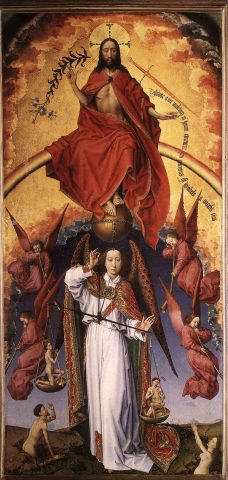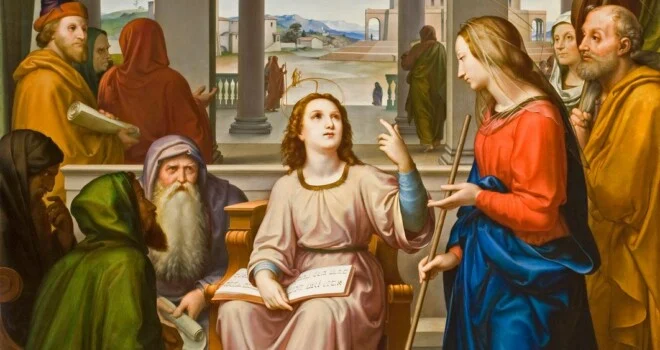On Belief Without Faith, by David Warren

Rev. Paul D. Scalia: Sacred Architecture and the Meaning of Community
February 15, 2019
AP: McConnell Says Trump to Sign Border Deal, Declare Emergency
February 15, 2019
*Image: The Last Judgment by Rogier van der Weyden, c. 1450 [Hospices de Beaune, France]. This is the center panel of the Beaune Altarpiece polyptych: the archangel Michael, scales in had, stands below Christ the judge.
By David Warren, The Catholic Thing, Feb. 15, 2019
 Allow me, O gentle and tolerant reader, to merge two of my current obsessions before your very eyes. I have mentioned what they are in the title.
Allow me, O gentle and tolerant reader, to merge two of my current obsessions before your very eyes. I have mentioned what they are in the title.
Belief, to my mind, is a comfort to many. This pertains to those who “believe” in God, those who believe in Dawkins’ Flying Spaghetti Monster, those who believe in the benignity of adders, those who believe in Bitcoin, and those who believe their pensions are safe with the government. (Descending order of probability.)
I believe in reason, because it seems to work, but more fundamentally I believe in it as a matter of faith. This is because I am a Catholic, a religion fairly unique in its insistence not only that God exists, transcending all natural existence (“supernatural” is the term the atheists mock), but that the universe He created has a natural order.
Moreover, that within our natural limitations, we can make sense of it.
For instance, we can usually distinguish men from women, clouds from dragons, up from down and so forth. Not always I must add, especially not when we are being wantonly and aggressively insane.
I believe in insanity, incidentally. There is plenty of evidence for it – all around – and as reason tells me, it is a hopeful thing. This is because beliefs founded in madness will go away when sanity is restored; and it will be restored, by nature.
Not first thing tomorrow morning, however. Or even in one lifetime, as those who have died by violence or in political prison camps would confirm. (That they can’t do so in person, being dead, I trust gentle reader to understand.)
I said that belief is comforting, and that would include the one just presented. Humans are themselves sufficiently supernatural that we may see a little beyond the horizon of our own material lives. Not far, but far enough to cope, I believe. And yes, I take comfort in this.
I have noticed that those who believe that the universe is senseless – that men can impose any order they like, arbitrarily – must act just as if the sun will rise in the east even while it is setting in the west, and do innumerable little things in the course of the intervening day that assume other continuities. For reason seems to work whether or not one believes in it.
There are people who genuinely believe that reality can be altered by human law, even when laws already on the books have been undermined. Instead of asking themselves, “But what if we enforced them?” they go campaigning for new laws that won’t be consistently enforced, either.
It was, for instance, already against the law to murder people or molest them in several other ways – whether for one’s own hateful pleasure, or convenience. (This is why abortions are and should be such a big issue.) The belief that inventing supplementary “hate crimes” will stop or deter anyone is a good example of our post-modern battiness.
Another good example is happening in Rome, just now. Heads of bishops’ conferences are meeting to discuss – “whatever.”
As Cardinal Burke says – and he should know, if you examine his credentials – we have had severe laws in place against priestly and episcopal malfeasance, including sex crimes, for many, many centuries. The (ignorant) belief that we haven’t seems to guide not only public opinion, but the behavior of many prominent churchmen.
Civil law is irrelevant, or was irrelevant, through most of that time. The Church herself had the means to do something, quite decisive, about perverts wearing collars or in embroidered robes.
She had been teaching that, e.g., homosexuality is disordered, all along – a matter of some interest when four of five alleged criminal sex acts by our (all-male) priests have been committed against boys past puberty. Until recently, she wasn’t shy about “disordered.”
Nor was she shy about resisting passing fashions until, “in the spirit of Vatican II,” her will to resist suddenly evaporated. But now she is so timid that when barefaced lies are told against her – I count the rot about “clericalism” and “synodality” among these, as neither term is used accurately – she truckles and apologizes, circling her own, like a herd of musk-oxen.
The absurdity of wasting jet fuel and hotel expenses on an international gathering to discuss a “problem” whose “solution” is self-evident, tends to undermine not only the authority but the plausibility of Holy Church.
Among the most absurd contemporary beliefs is in talk shops and committees that prattle all day, then draught long, incredibly boring, and counter-productive documents. The alternative is to appoint good men to established offices, and let them do their jobs.
The “problem” is described as a “culture” of deformity. Whether it is publicized or not, there are obviously homosexual cabals, reaching right up to the Curia and into the papal office itself. We can talk about this until we are bleeding in the lips, but the solution will be hard as it is simple: Root it out!
Which takes us to Faith.
It is my contention that a large proportion of our clergy, and of our laity, at every level, have undertaken to believe in things they have no faith in. What is the proportion I do not know – the gathering of statistics for what cannot be counted is another sign of the times.
But a priest, or any man, who perceives a duty, and does not act upon it, has no faith. He can believe anything he wants, and will, in order to comfort himself. “People believe what they want to believe.”
Right and wrong – Themis, Iustitia, Lady Justice – is no mere “belief,” as in some myth. Rather it is, in the teaching of our Church, a necessity. It goes beyond reason, to the heart of our God-created habitation. We have faith in it, or we have nothing.
_______________________________
*Image: The Last Judgment by Rogier van der Weyden, c. 1450 [Hospices de Beaune, France]. This is the center panel of the Beaune Altarpiece polyptych: the archangel Michael, scales in had, stands below Christ the judge.




